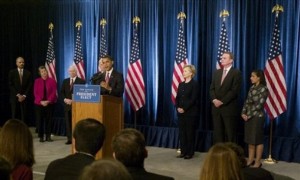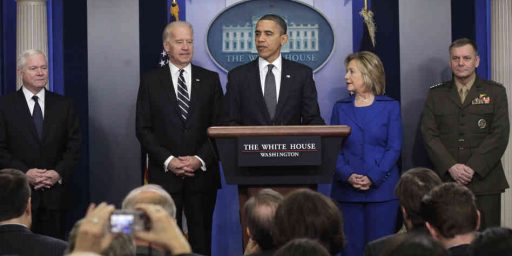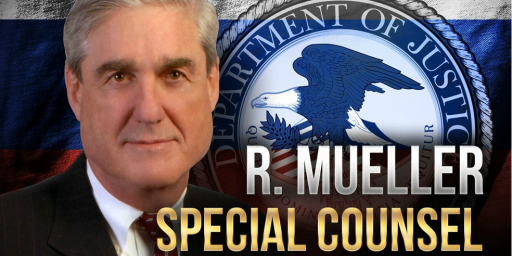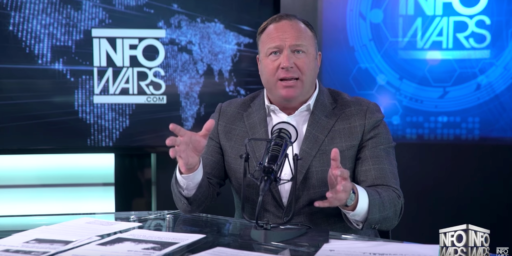Obama’s Bipartisan Cabinet

President-elect Barack Obama takes questions from reporters during a news conference in Chicago, Monday, Dec. 1, 2008, with, from left to right: Attorney General-designate Eric Holder; Homeland Security Secretary-designate Janet Napolitano; Defense Secretary Robert Gates; Vice President-elect Joe Biden; Secretary of State-designate Sen. Hillary Rodham Clinton, D-N.Y.; National Security Adviser-designate Ret. Marine Gen. James Jones; and United Nations Ambassador-designate Susan Rice.
CQ is calling Barack Obama to task for seemingly reneging on his campaign pledge to have a bipartisan cabinet.
Now that President-elect Barack Obama’s Cabinet is, by his count, half picked, the odds are fading that he’ll have more than one Republican on his team — suggesting that his campaign promise to include Republicans may have meant nothing more than the usual token appointment from the other side.
Obama did attract a lot of attention by asking Robert Gates to stay on as Defense secretary, and liberals have debated whether he’s the right man to oversee a withdrawal of troops from Iraq. But that debate overshadows the fact that Gates isn’t likely to have much, or even any, company. Of the Cabinet jobs that are left at this point, virtually all are domestic policy positions that would be hard to give to a Republican without prompting vicious internal fights, and it’s almost impossible to find Republicans who have been mentioned as candidates for any of them.
Josh Marshall retorts that, “In recent decades it hasn’t been particularly common for presidents to have any appointees from the opposite party. And when they do it’s usually like Bush appointing Norman Minetta to be Transportation Secretary, a secondary cabinet post of no real consequence to the president in question.”
Which the CQ piece pointed out. They also noted, though, that John Kennedy had two Republicans (SECDEF Bob McNamara and Treasury Secretary Douglas Dillon) and that Bill Clinton also appointed a Republican (William Cohen) as SECDEF. Their point is that Obama made a point of emphasizing a bipartisan cabinet during the campaign.
This does strike me as a weak attack, however. I don’t recall this being a central point of Obama’s campaign. The closest thing CQ comes to as evidence is one interview:
Charlie Gibson of ABC News asked Obama in late October if he wanted Republicans — plural — in his Cabinet, Obama replied, “Absolutely.”
As Josh notes, in addition to Gates — who considers himself a Republican even though he’s not registered — there’s General Jim Jones, who is coy about his partisanship but widely presumed to be a Republican given his Marine Corps past and his gig at the Chamber of Commerce, who will be Obama’s National Security Advisor. That’s traditionally an Executive Office of the Presidency position rather than a Cabinet post, but it’s splitting hairs. Jones will have Obama’s ear much more frequently than most Cabinet secretaries.
And, as CQ acknowledges, there are only so many spots where a Republican could realistically serve. There are only 15 cabinet agencies and a handful (currently 5) of positions that the president designates as “cabinet-level” for one reason or another. Obama is expected to make UN Ambassador a cabinet-level post in his administration; it’s not one under Bush.
Unless Obama turned the entire foreign policy and security apparatus over to the opposition party — a rather unreasonable suggestion — he’d be forced to put Republicans in key domestic policy posts. That doesn’t make sense, either, since those are the issue areas where bipartisanship is least likely.
AP Photo by Charles Dharapak






You’re right: it’s a weak argument. And President-Elect Obama has already answered it: one says things in the heat of a campaign that don’t completely represent what one might do or believe.
But more than that we don’t have a parliamentary system. We don’t elect platforms or parties; we elect presidents. If you voted for the guy without knowing enough about him to have any idea what he’d do as president, that’s your problem. If you didn’t vote for the guy, you’ve got no gripe at all.
This is just further evidence that Obama is a Barney Frank/Nancy Pelosi/Barry Bonds-type liar.
He is clearly unqualified to make decent appointments and would be well served by allowing Bush to stay on.
Let Bush run things and Obama can traipse around the world as head of government–a la Michaelle Jean.
And there’s still the appointing of the under-secretaries in DOD (Army, Navy, Air Force). These aren’t cabinet-level posts, so I’m not sure if placing Republicans in some of these posts would assuage the folks at CQ. But such appointments would count as bi-partisan, I think. Just not on the galactic level.
Can we see a stronger promise by Obama? This bit looks like a politician’s typical “absolutely” than a premeditated thing:
BTW, is “- plural -” part of the Gibson quote?
Why would we ever expect a politician to actually follow through on what they promised when running for office?
Everyone knows that it’s all for show to attract votes and that deception is acceptable for running for the highest office in the land.
People who don’t value truth in their everyday lives can hardly get excited when their leaders lie to them, can they?
So he didn’t keep his word. In some cases we should be glad he won’t keep his word.
He apparently isn’t keeping his word to the ACORN people and community organizers that he told he would invite to washington (first thing) to help define his administration. As most of the ‘heavy lifting’ of defining is administration is being done now via cabinet appointments, etc.., he can only invite some of them (ACORN) in later as a token move. (Which I doubt he will do).